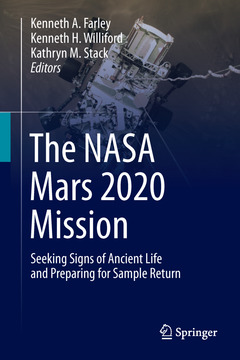Description
The NASA Mars 2020 Mission, 1st ed. 2022
Seeking Signs of Ancient Life and Preparing for Sample Return
Coordinators: Farley Kenneth A., Williford Kenneth H., Stack Kathryn M.
Language: English
Subjects for The NASA Mars 2020 Mission:
Keywords
Mars 2020 Rover; Mars sample return; Perseverance Rover instruments; Mars 2020 review papers; Space Science Reviews Mars 2020; Perserverance Rover mastcam; Perserverance Rover calibration; Mars 2020 science team; Mars 2020 mission objectives; Mars 2020 payload; Mars 2020 engineering; Perseverance Rover engineering
Publication date: 07-2023
1151 p. · 15.5x23.5 cm · Paperback
Publication date: 07-2022
1151 p. · 15.5x23.5 cm · Hardback
Description
/li>Contents
/li>Biography
/li>Comment
/li>
NASA?s Mars 2020 mission successfully landed the Perseverance rover in Jezero crater on February 18, 2021.This book provides the definitive pre-landing documentation of the Mars 2020 mission, its scientific payload elements, and its exploration area.
The chapters in this volume include detailed descriptions of:
- The Perseverance mission, and its relationship to a possible Mars Sample Return campaign;
- The geology of the mission?s exploration environment in Jezero crater; and
- The purpose, design and operation of all seven instruments aboard the rover (Mastcam-Z, SHERLOC, RIMFAX, Supercam, MOXIE, PIXL, and MEDA) as well as the engineering cameras and the Mars helicopter Ingenuity.
NASA's ambitious Mars 2020 mission extends a long arc of Martian exploration by seeking evidence that life may once have existed on Mars, and by preparing a collection of samples forpossible return to Earth by a future mission. Mars 2020 will also enable future exploration by characterizing modern weather conditions and by demonstrating new technologies.
Previously published in Space Science Reviews in the Topical Collection "The Mars 2020 Mission"
1. Mars 2020 Mission Overview
2. The Ingenuity Helicopter on the Perseverance Rover
3. The Sampling and Caching Subsystem (SCS) for the Scientific Exploration of Jezero Crater by the Mars 2020 Perseverance Rover
4. The Mars 2020 Engineering Cameras and Microphone on the Perseverance Rover: A Next-Generation Imaging System for Mars Exploration5. The Mars 2020 Perseverance Rover Mast Camera Zoom (Mastcam-Z) Multispectral, Stereoscopic Imaging Investigation
6. Radiometric Calibration Targets for the Mastcam-Z Camera on the Mars 2020 Rover Mission
7. Pre-Flight Calibration of the Mars 2020 Rover Mastcam Zoom (Mastcam-Z) Multispectral, Stereoscopic Imager8. PIXL: Planetary Instrument for X-Ray Lithochemistry
9. Correction to: PIXL: Planetary Instrument for X-Ray Lithochemistry
10. Radar Imager for Mars’ Subsurface Experiment—RIMFAX11. Perseverance’s Scanning Habitable Environments with Ramana and Luminescence for Organics and Chemicals (SHERLOC) Investigation
12. The SuperCam Instrument Suite on the NASA Mars 2020 Rover: Science Objectives and Mast-Unit Description
13. The SuperCam Instrument Suite on the NASA Mars 2020 Rover: Body Unit and Combined System Tests
14. SuperCam Calibration Targets: Design and Development
15. Mars Oxygen ISRU Experiment (MOXIE)
16. The Mars Environmental Dynamics Analyzer, MEDA. A suite of environmental sensors for the Mars 2020 mission
17. Multi-model Meteorological and Aeolian Predictions for Mars 2020 and the Jezero Crater Region
18. Meteorological predictions for Mars2020 Perseverance rover landing site at Jezero crater19. Photogeologic Map of the Perseverance Rover Field Site in Jezero Crater Constructed by the Mars 2020 Science Team




